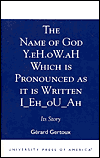- 4/5 -
![]()
![]()
To begin, writing the name of God is not a problem: it is composed
of four letters YHWH called the Tetragram. How is such a name
pronounced? Dictionaries and encyclopedias indicate that Yahve (or
Yahweh) is an uncertain vocalization, and that Jehovah is a
barbarism originating from a wrong reading. As unbelievable as it
may seem, this last affirmation is known to be false among
scholars. This crude error has been denounced by Hebraists of all
confessions, and with the support of the Vatican's Congregation of
propaganda, but without result.
This name YHWH is read without difficulty because it is pronounced as it is written, or according to its letters as the Talmud says. In fact, up until 70 CE, on the day of Yom Kippur the high priests read the blessing in Numbers 6:24-27 pronouncing YHWH according to its letters, that is to say as it was written. Indeed, this name is the easiest one to read in the whole Bible because it is made up of four vowels as Flavius Josephus noted. The question of knowing which vowels accompanied the letters YHWH is absurd, for Masoretic vowels did not appear before the sixth century CE. Before this, Hebrew names were widely vocalized by the three letters Y, W, H, as the manuscripts of Qumr‚n widely confirm. The letter Y was read I (or E), the letter W: U (or O), and the letter H: A at the end of words. For example, YH was read IA, YHWDH was read IHUDA (Juda). The name YHWH was therefore read IHUA (Ihoua). For the H, which was almost inaudible, to be better heard a mute e could be added, thus the name YHWDH read literally I-H-U-D-A then became I-eH-U-D-A, the exact equivalent of the Hebrew name Yehudah. This slight improvement gives the name YHWH the pronunciation I-eH-U-A (Iehoua), the equivalent of YeHoWaH in Masoretic punctuation. This coincidence is remarkable; even providential for those who believe that God watched over his Name (obviously without the copyists knowing!).
